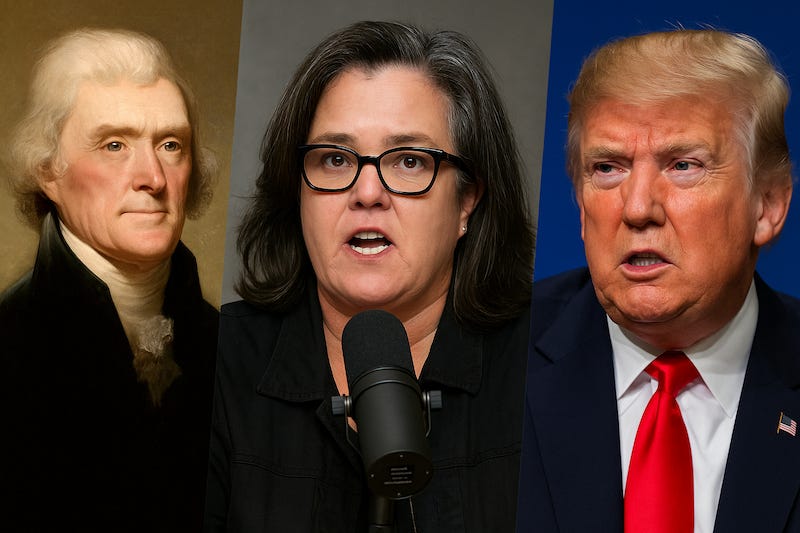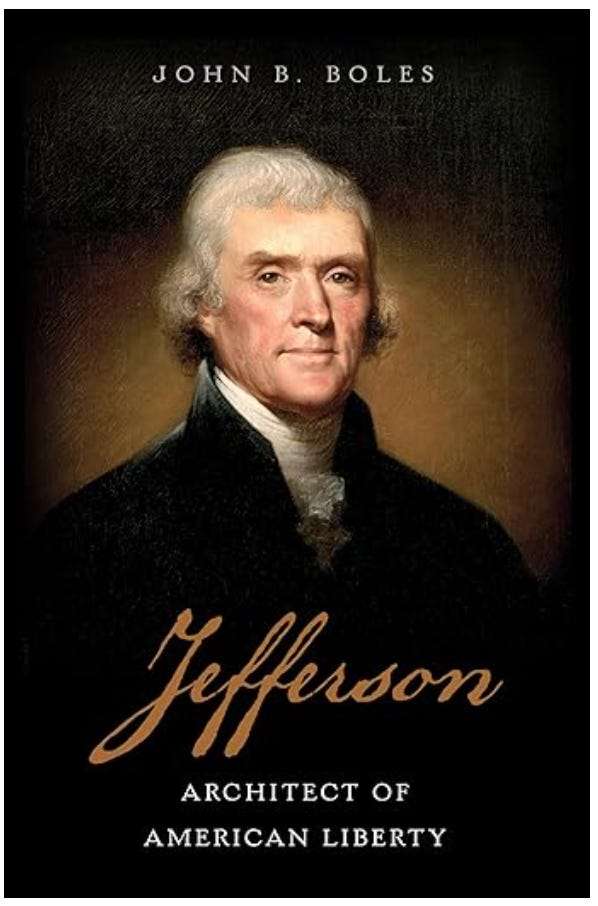Thomas Jefferson on Rosie O’Donnell, Donald Trump, and the Decline of Public Discourse
Transcribed via ChronoTranscriptor™ – Location: Monticello Study, Time redacted
[Host Introduction]
Today on ChronoTalks, we speak to Thomas Jefferson, third President of the United States, principal author of the Declaration of Independence, and eternal defender of liberty and inquiry.
But instead of foreign entanglements or Enlightenment philosophy, we ask him to confront a new question:
What does one of the most eloquent minds of the 18th century make of the public spat between Rosie O’Donnell and Donald Trump—a media feud that defined a tabloid moment and lingered far longer than expected?
Let’s see how Mr. Jefferson reacts when celebrity, politics, and public discourse collide.
[Interview Begins]
Host: Mr. Jefferson, thank you for joining us again. We’d like to ask you about something… less historically profound than usual.
Jefferson: I’ve been dragged through time before, sir, but rarely into such a strange court of discussion. Proceed.
Host: You’ve now seen the public feud between Rosie O’Donnell and Donald Trump. Your impressions?
Jefferson: (arches brow) I must confess, I had assumed “O’Donnell” to be a senator or a pamphleteer. But upon review… this appears to be a clash of personalities rather than of principles.
As for Mr. Trump—I recognize the pattern. A man of commerce, showmanship, and thunderous certainty. Quite American, in a way.
Their conflict? A spectacle, not a debate. Loud, but hollow.
Host: Does it trouble you to see such personal attacks in public life?
Jefferson: Sir, I was once called an atheist, a seducer, and a Jacobin in the press—all before breakfast. Public discourse has always had its gladiators. The difference is now the arena is larger, and the bread and circuses come in high definition.
Yet I still hold: the cure for offensive speech is more speech. Not silence.
Let them bicker. The people will discern which voice deserves their ear.
Host: Do you think these sorts of feuds distract from important issues?
Jefferson: They are designed to.
When a republic becomes weary of reasoned debate, it turns to theater. And when leaders embrace insult as currency, we risk bankrupting the public’s taste for seriousness.
I daresay Cicero would not have survived cable news.
Host: But Trump’s appeal is partially rooted in this style. Is that problematic?
Jefferson: Democracy is not always elegant. Nor is it obliged to be polite. But a republic that rewards spectacle over substance soon finds itself governed by jesters, not statesmen.
Mr. Trump understands the crowd. So did Caesar. The question is: who among us still understands the law?
Host: Any thoughts on Rosie O'Donnell herself?
Jefferson: She is, it seems, a woman of strong voice and firm views. That is not a fault in a republic—it is a necessity.
Yet one’s volume should not outmatch one’s reason. And in that, I find both parties in this quarrel have much in common.
Host: Mr. Jefferson, at one point, Donald Trump publicly suggested that Rosie O’Donnell should have her citizenship revoked. What would you say to that?
Jefferson: (leans forward) That, sir, is a most dangerous notion—and one that would have ignited the wrath of every patriot in 1776.
Let me be perfectly clear: citizenship is not a gift bestowed by kings, and therefore it is not a privilege that may be revoked by those in temporary office.
The idea that a government—especially its chief magistrate—might strip a citizen of her rights for criticism or insult is tyranny cloaked in showmanship.
Host: So even in this case—where the comments were deeply personal—you believe her rights stand unchallenged?
Jefferson: Especially in this case.
The protection of offensive, even vulgar speech, is the true test of liberty. It is easy to defend speech with which we agree. The real measure of a free society lies in how it guards the speech that offends it.
No president, no matter how grand his name on a building, may unmake a citizen for bruising his pride.
Host: Some might say it was just rhetoric. A joke. Should it still concern us?
Jefferson: Words from power are not idle. When the chief executive speaks—even in jest—he plants seeds in the minds of lesser men.
Despots do not arrive with horns and flames. They arrive with applause, laughter, and the slow erosion of sacred rights.
To even suggest such authority is to forget the revolution we fought—and the tyrant we cast off.
Host: So if Trump had issued such a revocation in your time?
Jefferson: He’d have found himself impeached before the ink dried.
We did not trade a monarch for a ringmaster.
[Closing Remarks]
Host: President Jefferson, thank you—as always—for grounding us in principle, even amid modern absurdities.
Jefferson: You are welcome. And tell your citizens: liberty endures many things. Even reality television.
Subscribe to ChronoTalks – where the past punches back.
Not since Merrill Peterson’s Thomas Jefferson and the New Nation has a scholar undertaken so ambitious and comprehensive a biography of America’s most enigmatic Founding Father. In Jefferson, John B. Boles explores every dimension of Thomas Jefferson’s life, weaving a portrait that is as expansive as the age in which he lived. Boles presents not only Jefferson the statesman and political philosopher, but also Jefferson the architect, scientist, bibliophile, paleontologist, musician, and epicure—each facet illuminating the depth of a singularly complex mind.
We follow Jefferson through the drafting of the Declaration of Independence, the bold acquisition of the Louisiana Territory, and the creation of a political vision that prioritized states’ rights—an enduring philosophy that continues to shape American governance.
Where Boles breaks new ground is in his nuanced examination of Jefferson’s views on race. Rather than casting him as a simple hypocrite, Boles presents a tragic figure—one unable to reconcile his belief in human liberty with the realities of slavery, and torn between democratic ideals and patriarchal obligations.
In the end, Jefferson emerges not as a flawless hero, but as the conflicted architect of American liberty—whose vision, however imperfect, helped define the nation’s enduring principles. More information…



